Annie was worried; I could see it by the way she rode. She was just a tad rigid in her focused attention in trying to stay with it. It’s what we all do when we know the horse under us could easily blow up. She knew the young mare Maggie would likely want to run once we turned her out in the big country again, and Annie was going to try to stick to her back, despite it being only her second ride “outside.”
It’s what we call anything off the ranch, beyond the corral fence. Often, the next fence might be anywhere from 5 to 20 miles away. Not much hope of stopping a wild mare on the run. Or finding her.
What made matters worse is that Maggie knew that country better than any of us. After all, she was born there and was born wild–running on the 70 square miles of wide-open range that we summer graze our cattle on. We simply call it “the Range.” Or “Hat Creek.” The young mare could rewind memories of just a few years back–and easily bolt off to try and find the common hangouts of her band of horses–the tribe where she came from.
In Annie’s mind, that run could easily turn into a high-speed recoiling and back-breaking buck, and although Annie had ridden out some buckers, she also had come off. One rotten aspect of getting bucked off was that she knew she could easily end up becoming part of some rockpile in these Rocky Mountains where rocks are more common than dirt. Given that bit of information there was usually at minimum pain involved in landing. At maximum a girl could find arms, hips or head broken on impact.
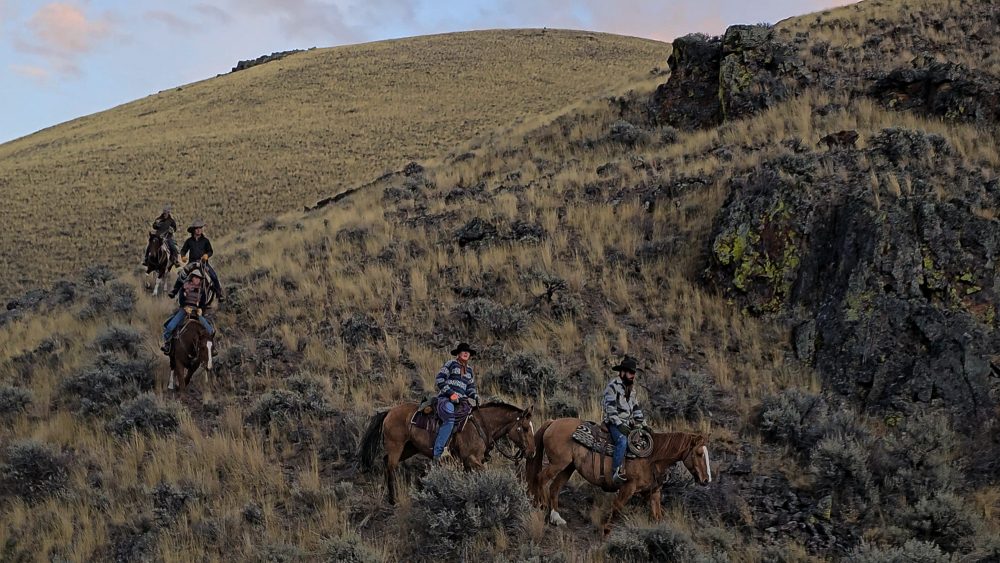
Most of us could relate. My own ribs still were crooked after healing thus after several rough and tumble horse wrecks. If you’re wondering, the horse almost always fares better. Most of the time they are up and grazing a few feet away when we “come to.”
There were 8 of us on this ride–and it was dual purpose, as it usually turns out. In the big loop we would ride, we had a destination, or a job to do, first off, and secondly, Annie, Rose, Josh, Jed and Melanie were all on green colts. Annie’s was the very greenest.
If we talk about wild horses, Maggie’s not a mustang in the truest sense of the word. That’s one of those wild horses that have been running free on the ranges for centuries, some of which still have Spanish conquistador bloodlines in them. Instead, these were horses that local ranchers turned loose on the range years ago–some were legal and under permit, and some were not.
Maggie was one of the “were nots.” It’s because she was born a tiny foal up there and ran literally wild with the band in wolf and lion country free for several years until she was gathered up at the ripe old age of 4 by a friend of ours up the Salmon River. He called us, knowing that we were always on the lookout for some fresh horses, and we loaded her up with about 7 others.
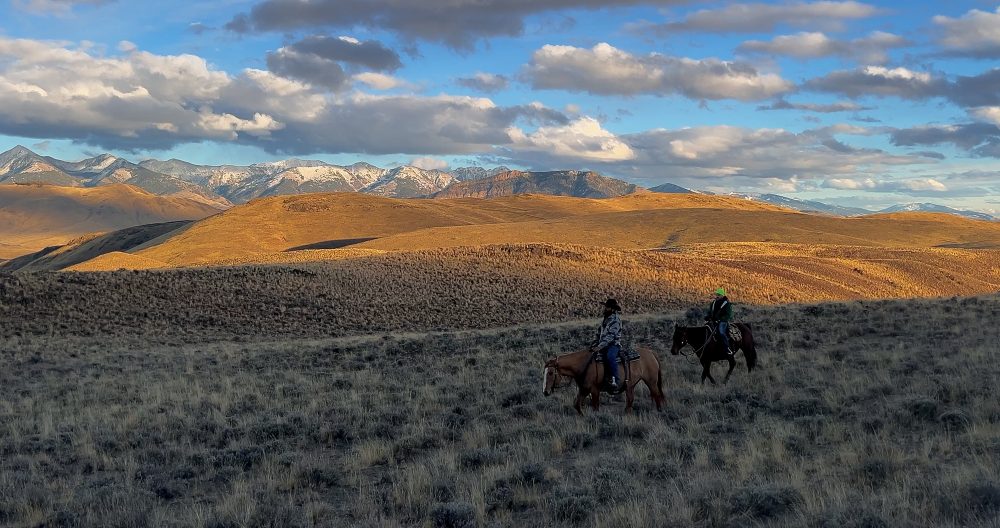
We’d likely seen Maggie when she was just a little filly running with the band. The great black stud, a super intimidating beast with a massive neck and no name would bring his harem and their young periodically down in the black of night close to camp. We could hear them coming, as did our own ranch string of 15 or 20 horses, turned out in a single poly-twine hotwire pasture. They were vulnerable, and the only solution we had at the time was to emerge from the bunk or cook-tent and haze the wild ones off with pistol shots in the air. It worked, but we always had to be on guard.
It was a little ironic that today, on this ride, 3 of the horses we rode came from that very bunch. The wild ones.
“You’ll never get a good start on them,” one crusty gray-haired and grizzled cowpoke neighbor told Melanie. “They won’t be no good—and I reckon you’ll never trust them. Might as well take a gun to their heads or send ’em off on a truck.” He meant to Mexico. Horsemeat was legally processed and sold there. “Yessir. Ain’t no good. ‘Cept if you want to get yerself killed.” He smiled with a broken toothed grin, ground his truck in gear, and drove away.
Melanie and Annie just quietly nodded, and watched silently as the dust trail rose and fell while the old gent drove away. Good or bad, they were as doggedly stubborn as their mother was.
One of the eight riders yesterday was a visiting book author from New York. He was 30-something young, athletic looking and thought he’d throw in with us on horseback. He said he had ridden, and we were wondering how often until about halfway through when between moans he confided in me that it was unlikely that he’d ever be able to father children after today.
He might have ridden, but maybe he hadn’t ridden much. He gained a lifetime of experience today.
And it was a rough ride. With the wild ones, especially Annie’s, there were occasions where we were just simply hanging on out there in the wind, sweeping, loping, and then nearly stampeding across the wide open of Bear Basin. Then there were times when we on the solid mounts got stuck in the back on a narrow elk trail pasted to the steep of an endless mountainside. In this position, for me on Gatto, there would be no heading off the leaders from a dead run. It’s what my job was from the beginning—to cut in front of them if they took off. But on this narrow trail, there were no options. Suddenly, the wild ones would crank up to near wide-open, and all we could do was to hang on and try to keep up.
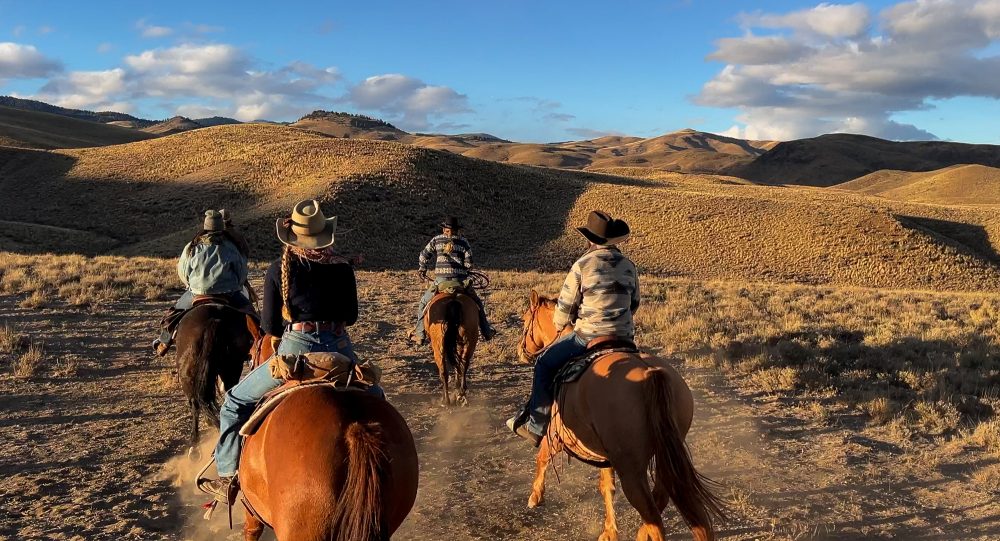
On all of the young colts, especially Annie’s filly, the problem was that there were no brakes. Certainly, there was a snaffle bit in all of their mouths, but at this point in their education, they really didn’t make the connection that the pulling back meant to slow down or stop. Instead, they’d likely feel trapped, and unable to move their head or neck.
And when that happened, they could become bound and determined to unload the freeloader human on their back.
It was more than a little exhilarating. Added to that was the astounding beauty we rode in. The backdrop of the craggy high Lemhi Range, white with snow, turned to a rosy alpenglow as the wind caressed the endless golden hills of waving tall grass we rode on. Below us to the south, the wide and austere Pahsimeroi Valley, surrounded by glowing peaks, rolled out over 50 miles. The epic Tibetan-like scale and color of the country was unforgettable, and even Annie in her near-bronc distress mentioned the staggering significance of this day.
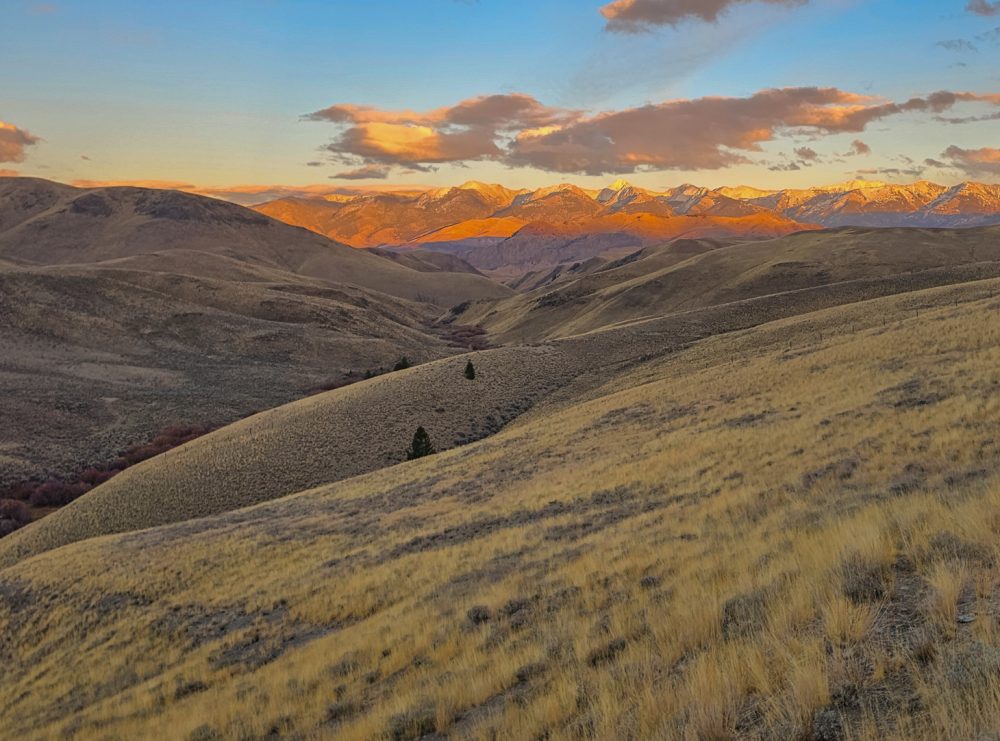
We all felt like this day was the parting gift of autumn.
The alpenglow cast of the distant peaks shifted into the rise of a waxing gibbous moon of uncanny brightness as we worked our way across the expansive grasslands of Bear Basin into upper Pig Canyon. A mile or so before we got to the canyon I took the solid gelding Gatto to the lead of the 8-horse line to discourage any running or bucking outbursts by the young and unpredictable. Wrecks of any kind were mortally dangerous in the canyon, where ancient and rocky foot-wide trails used by everything from bison to bears were stuck to the steep and rocky faces of the grotto. Before we dropped off the rim from the high and lonesome Bear Basin expanse, the clear beacon of Venus showed her face in a goodbye to the West just as Jupiter greeted us from the East. And then, they were gone. We dropped over the rim. The canyon was dark in places where the steep sides even hid the face of the moon, now gaining altitude overhead.
The eight riders became silent, as if in respect to the range itself, which stood unusually mute. All of the life that we had been accustomed to in the teeming surge of spring and summer was either in hibernation or had migrated for parts south. It was almost unsettling. Even the wind had halted in the bowels of the canyon. It was like we rode on the moon itself.
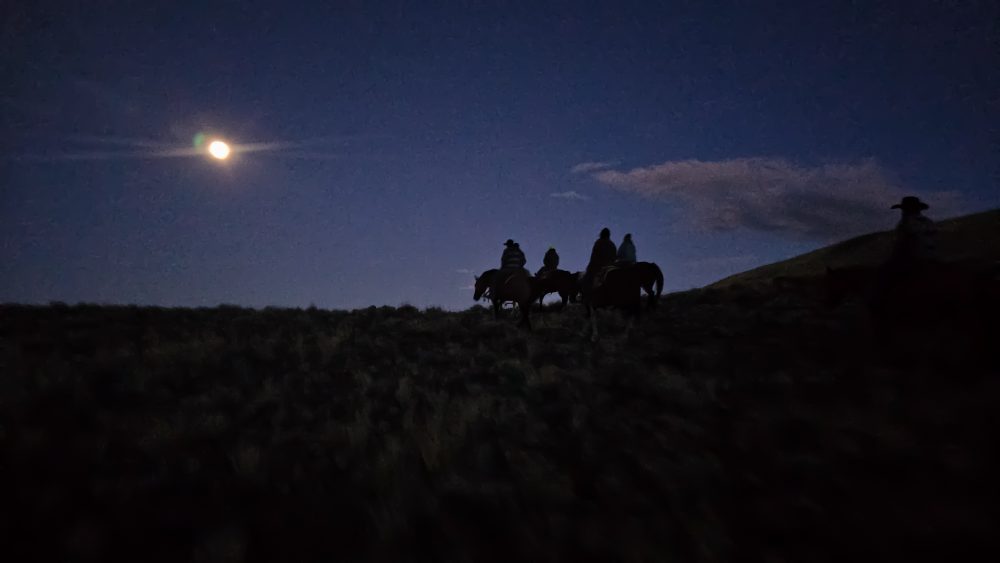
Finally, our sojourning along the game trails led us out of the canyon to the “drop point” once again, the place where our ride started about 5 hours ago. The ghosty shape of our stock trailers materialized in the lunar wash. As we pulled up, Annie’s moonlit face clearly displayed a sense of combined accomplishment and relief. These early rides were so important in a young start’s foundation, and if they have a good experience, trust becomes easy to build.
Trust is everything. Maggie’s first long ride out was uneventful, albeit a little out of control and fast. I tabulated our total miles and realized that we covered some rough country dang fast.
As we loaded up and headed out, our more-than-a-little saddle-sore author friend asked about “breaking” these horses. “Is that what it is called? ‘Breaking?’”
By the way he walked, I was thinking he might be the broken one.
Melanie knew the words better than any of us. Out of all of us she has the most sense about horses and is officially “head of horse” on the ranch. “Some people call it that. We like to call it starting. We start colts, or horses.” She went on to describe that she felt like we are giving them a start on their new lives, and a chance to build a relationship with us.
Sometimes we see folks who train horses who use fear as part of that relationship. I see the same thing with dogs. Owners sometimes make their dog or horse fear them, or fear pain, and that is the reason the animal does the human’s bidding. But, like us humans, if they are given opportunity to bail on that toxic relationship, they 100% will cut and run, either figuratively or actually.
The opposite is that those animals we build relationships with will put it all out there for us. I think of Clyde, my border collie. He would die for me. Actually. If he knew that I was somehow in danger, I’m confident he would lay it all down.
I felt the same for horses started by my daughters. They come to trust—completely—the girl who starts them, and later humans that follow. They would do anything for them and go until they simply had nothing left to go anymore. Even then, they would keep trying. I’ve seen it time and time again where one of my daughters asks their young horse to do the most unreasonable thing—to rope a steer when they’ve never roped before, or to ride down a trail-less cliff, or to cross a bottomless swamp. The horse just does it, because their girl has asked them to do it. And her body and “softness” on them tells them that everything will be ok.
It’s beautiful, particularly with the wild ones. They are horses of great resolve that know the country and will surefootedly run with abandon across their native rocks if you ask them to.
Melanie said it simply, as we bumped down the rocky road that led off the range in the moonlight. “They become our partners.”
And they’ll put it all on the line for us.
Happy Trails.
Glenn



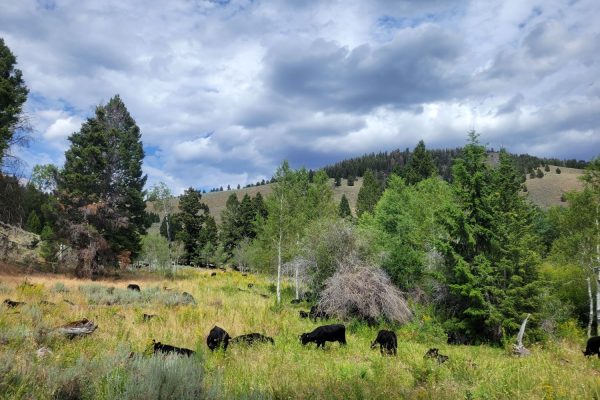



Mike Morano
A thoroughly enjoyable read! Well done and thank you.
Harrison Heidel
I look forward to Glenn’s stories every week.